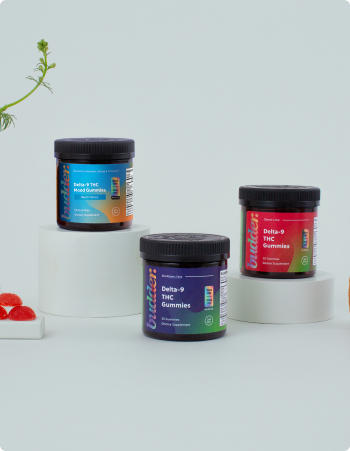If you’re looking for a natural way to support restful sleep, you may have heard that THC could be useful. But is this really true? Sure, sometimes you may even feel a little relaxed after consuming THC. However, does THC help you sleep? Let’s take a closer look at the relationship between sleep and THC!
Why Regular Sleep Patterns Are Important
Quality sleep is more than just getting your beauty rest. Getting enough sleep every night is crucial for maintaining good health. While you're sleeping, your body gets hard at work repairing and renewing itself so that you wake in the morning feeling rejuvenated and ready to crush the day.
The sleep cycle can be divided into four stages. Each stage is characterized by distinct changes in brainwave activity and physiological processes. Their duration also varies by stage.
- Stage 1 (~5-10 minutes): Light stage of sleep where you transition from wakefulness
- Stage 2 (~25 minutes): Brain waves slow, body temperatures decrease, and heart rate and breathing decrease
- Stage 3 (~20-40 minutes): Slow-wave sleep, where brain waves continue to slow, and body relaxation deepens
- Stage 4 (~10 minutes): Rapid Eye Movement, or REM sleep, where brain activity increases, and dreams happen
It typically takes around 90 minutes to go from stage 1 to stage 4. For those who experience broken sleep, getting uninterrupted 90-minute sleep cycles could be challenging. However, it’s important that your body gets REM sleep because that’s when memory consolidation occurs.
We take in a lot of information throughout the day. Memory consolidation is essential for sorting out the useful and the useless. Therefore, REM sleep is crucial for long-term memory recall, cognitive function, and alertness.
On average, our bodies go through the sleep cycle four to six times per night. The longer you stay asleep, the deeper each REM sleep cycle becomes. Therefore, sleep experts suggest getting between 7-9 hours of sleep per night to ensure our body and mind goes through each stage adequately.
Health Effects of Poor Sleep
Do you find yourself up all night with the owls? Well, you aren’t the only one! In 2020, 14.5% of adults dealt with sleep problems on most nights.
While poor sleep patterns are common, they shouldn’t be accepted as the “norm.” Inadequate sleep can negatively impact your mood, productivity, and more.
As a result, millions of people turn to over-the-counter sleep medications to help with sleep. While effective, sleep aids aren’t meant to be taken daily. With time, sleep medications can lose their effectiveness or even promote their own negative health effects.
One study involving 38 marijuana users found that 71% of users experienced improvements in their sleep patterns. However, studies are still limited, which still begs to answer the question, “Can THC help you sleep?” Let’s take a closer look.
How Does THC Help Sleep?
THC, as well as other cannabinoids, influences sleep through the central nervous system by acting on CB1 receptors. However, the outcome depends on how much THC is in the system.
Long-term studies on the effects of THC and sleep are still in their infancy. Current research suggests that low amounts of THC may positively impact how long it takes to fall asleep and influence slow-wave sleep.
Low amounts of THC, like those found in CBD sleep gummies, support a calm mind and positive mood. Those who have stiff muscles from working out may experience temporary comfort. These benefits could all be ingredients to a dreamy recipe for a good night’s sleep.
How Does THC Affect Sleep Negatively?
While THC could support sleep for some people, it's important to be mindful of how much THC you consume and when. Consuming too much THC or using it too close to bedtime can actually have a negative impact on your sleep.
A 2021 study compared the sleep patterns of frequent marijuana users based on three profiles:
- Frequent smokers (20-30 days per month)
- Moderate smokers (< 20 days per month)
- Non-smokers (0 days per month)
Results found that moderate and non-smokers had more steady sleep patterns than heavy users. Even more interestingly, the frequent smokers were split as to whether they got too little (short sleep) or too much sleep (long sleep).
Short sleep is defined as sleeping a total of six hours or less. Marijuana can make your heart beat faster and raise blood pressure immediately after use. These are the opposite effects we desire before bedtime. That’s when our heart rate and blood pressure should be decreasing.
As a result, excessive THC close to bedtime can lead to frequent awakenings throughout the night. Experiencing broken sleep will inevitably disrupt your sleep cycles.
Long sleep is when you sleep over nine hours during the night. As dreamy as that sounds (literally), long sleep is also known as “oversleeping.” Oversleeping can be an indication of an underlying health problem. If you believe you are sleeping too little or too much, please speak to your physician.
Can THC Make You Tired?
Feeling tired is not the same as getting sleep. Many people who have trouble sleeping already feel sleepy.
While low amounts of THC can potentially aid with sleep and high amounts of THC can disrupt it, both may make you feel tired.
In some instances, both low or high levels of THC may cause enough grogginess for you to fall asleep. However, as we’ve discussed, high levels of THC won’t help you stay asleep.
Plus, broken sleep might not be very restful. As a result, you may wake up even more tired. In that case, THC has once again made you tired. Just indirectly this time!
Lastly, too much THC can spill over into the next day. Many people who go a little overboard with THC could experience temporary grogginess the next day. Those who’ve experienced this fleeting fog call it the “weed hangover.”
Why Does THC Make You Feel Sleepy?
Many factors influence why THC can make a person feel sleepy. The main reason is due to its interaction with CB1 receptors. CB1 receptors are prevalent throughout the central nervous system.
THC and other cannabinoids help promote relaxation throughout the mind and body. Without thoughts stimulating our brain or muscles aching, we feel more at ease. This comfort may manifest as THC making you feel sleepy.
As we’re about to discuss, some strains have an uplifting effect. Avoid these types of cannabis strains before bed.
Cannabis Strains to Avoid for Sleep
Nothing can derail a pleasant night’s sleep more than an uplifting buzz. Energized types of highs are usually promoted by sativa-dominant cannabis strains. They tend to have high THC levels, which could potentially disrupt your sleep cycles.
Try not to consume products made with these uplifting strains:
- Sour Diesel
- Super Lemon Haze
- Strawberry Cough
- Ghost Train Haze
- Viper City OG
Best Cannabis Strains for Sleep
Picking the right cannabis strain is the key to setting the tone for a restful night’s sleep. You may want to stick with an indica-dominant strain. Indica strains are more likely to invoke couch-lock (or in this case, bed-lock) than sativa ones.
For a better chance of quality sleep, try to pick a strain that has a low THC, high CBD profile. CBD will help balance out the overstimulation caused by excessive THC.
Blissfully transport off to dreamland with these bedtime-friendly cannabis strains:
- Hindu Kush
- Grandaddy Purple
- Northern Lights
- Harlequin
- Sweet and Sour Widow
Potential Negative Side Effects of THC for Sleep
Using THC for sleep daily may have potential side effects, such as increased tolerance, which can lead to overuse. It may become habit-forming and start to have the reverse effects that you desire.
Whether it’s marijuana or over-the-counter pills, no sleep support formula is intended to be a long-term solution. If you are experiencing continual sleep problems, please speak to a physician. You may have an underlying condition or be at an increased risk of developing one.
Using THC for Sleep
Consuming THC for sleep could be useful for some people. THC could potentially make you feel tired, support falling asleep, and help with restful sleep.
However, too much THC can start to have the opposite effect. It's important to be mindful of how much THC you consume. Remember to speak to a physician if you continue to exhibit sleep problems.
If you use THC for sleep, try consuming it about an hour before bed. Opt for strains that are indica-dominant and have lower THC levels. Ultimately, the key to getting a good night's sleep is finding an approach that works best for you and your individual needs.































































Join in on the Conversation
Your email address will not be published. Once your comment is approved, it will be published.
Leave A Comment
Rating
0
Name *
Email *
Comment *